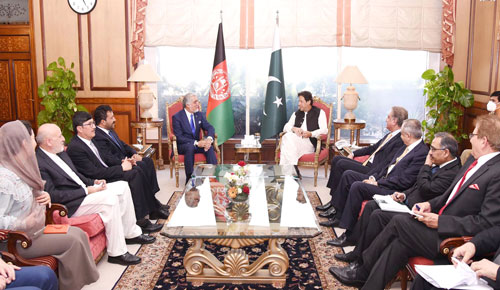Staff Reporter
Islamabad
The Chairman of the High Council for National Reconciliation of Afghanistan Dr Abdullah Abdullah, held a meeting with Prime Minister Imran Khan and matters pertaining to bilateral relations and the regional situation came under discussion. Afghan peace process was also discussed in the meeting.
Commending the start of the Intra-Afghan negotiations in Doha on September 12, Imran Khan expressed the hope that Afghan leadership would seize this historic opportunity to work together constructively and secure an inclusive, broad-based and comprehensive political settlement.
Extending a warm welcome, the prime minister conveyed his best wishes for the successful outcome of the Afghan peace process and expressed the hope that Dr Abdullah Abdullah’s visit would help open a new chapter in the bilateral relationship between Pakistan and Afghanistan.
He further reaffirmed Pakistan’s full support for the post-conflict Afghanistan on its path to reconstruction and economic development.
In the bilateral context, prime minister Khan highlighted that Pakistan and Afghanistan had immense trade complementarities and emphasized the need to optimally utilize these capacities for mutually-beneficial trade and transit.
He assured that Pakistan would continue to undertake all efforts to facilitate Afghan transit trade and deepen our bilateral trade and economic ties and people-to-people exchanges with Afghanistan.
The prime minister said he was looking forward to his visit to Afghanistan on the invitation of President Ashraf Ghani.
Earlier, Dr Abdullah in an address to the Institute for Strategic Studies in Islamabad, said on Tuesday that the ongoing Afghan peace talks are the best hope for the region, and added that it was now time for Pakistan and Afghanistan “to define a new vision”.
“The time is now for both nations, to make a further detour, define a new vision, address outstanding issues as well as our shared interest, [and] realise that peace and stability in Afghanistan or any country in our south and central Asian geography [will] have a far reaching ripple effect,” said Dr Abdullah. He thanked Pakistan for facilitating the Afghan peace process and the country’s efforts in ensuring the opportunity for dignified, durable and sustainable peace in the war-torn country. “Pakistan has played an important role in facilitating this moment, and my delegation and I, thank you, the government and people of Pakistan for their efforts,” said Dr Abdullah.
The Afghan leader, who is in Islamabad for a three-day trip, emphasised that the start of negotiations between Kabul and the Taliban movement is an “important opportunity”. He added, that as he was speaking in Pakistan, delegations from both the sides were in Doha “sitting around a table discussing ways and means of ending the decades of conflict through a political settlement in Afghanistan”.
The chairman for the reconciliation council urged that there is a “need to go beyond the usual stale rhetoric and shadowy conspiracy theories”. “We cannot afford to pursue business as usual. We need fresh approaches that our people demand from us. It is more urgent than ever to look to our region as one region,” observed Dr Abdullah. “We also need to draw necessary lessons of our gains and losses, threats and opportunities,” said Dr Abdullah.








